They don't need a warrant
A federal kidnapping in Worcester

by Bill Shaner
Help pay for our independent reporting if you can.
I'm driving five miles across the city to check out a tip that there's an ICE rendition ongoing. I've got the scanner on the car stereo as I'm about to pull onto the street in question. It’s a quiet neighborhood, small houses on small lots, people walking dogs, the mailman waving, the lawnmowers running, and I hear the dispatcher: "We have an ICE officer over there who's allegedly being surrounded."
"On our way," the officer responds.
As a local reporter for a decade now, I've learned that you can hear the cops at their most honest on the scanner. And as I'm hearing that “surrounded” comment I remember what the city's police chief told the city council in January:
"We do not do civil detention arrests," Police Chief Paul Saucier said at the time, reassuring them that they wouldn’t be party to the ICE assault Trump was about to unleash. The police, he said, "do not have the authority to affect a civil arrest."
What he didn't say is that if you try to stop the civil arrest, the police will stop you from stopping it.
This morning a few dozen of us here in Worcester Massachusetts got to see that unstated fine print in action firsthand. A woman was led by federal agents in cuffs away from her family, through a throng of community organizers trying to stop it, and into an unmarked car. The local police arrived to prevent the community from protecting their neighbor from an unlawful kidnapping. They succeeded, and in the process arrested two of the people who tried to stop it.
I park my car on the edge of the scene and all I can hear are the screams—the deafening desperate screams, from a mother, from her daughter, from the woman holding the daughter's baby. Wordless screams.
And then I see the mother, a young woman in a green shirt, wailing, crying, held on either side by menacing white men in tactical vests, black neck warmers pulled over their noses in the style du jour for our secret police forces.
Surrounding them are a few dozen community members who were tipped off about the ICE raid and got to it before the police did. Before I arrived, they demanded to see a warrant. The ICE agents refused to provide one, so they created a human chain, which the ICE officers eventually broke through.
I still don't know her name or where they've taken her. The federal officials provided no information to anyone at the scene. But apparently they called the local police for backup. They felt that they were surrounded. Black Hawk Down.
As they're marching this woman to the back door of the tan unmarked Ford SUV representing her nebulous fate, the community is swarming, surrounding, yelling at the ICE officers. City Councilor Etel Haxhiaj, a dear friend and a relentless advocate for her community, is following closest behind them. She's screaming. "You are cowards." She's jogging to keep pace as they march their jackbooted march to the SUV with New York plates. "This is an innocent woman."
An ICE agent opens the door and the woman's daughter shrieks—an unforgettable noise of agony. Her mother is about to disappear, into the purposefully vague bureaucratic world of forced removal. The opening of that door, to this shrieking girl... it must look like a life torn apart. Her family fractured. And for what? No one bothers to explain that to her. Perhaps they’re not allowed to. The rules.
The Worcester Police Department steps in at this crucial juncture, among us residents surrounding the car about to take one of our neighbors away. And they do so on behalf of the ICE agents, not us. A Worcester cop comes over, stepping between the open car door and the community, past the ICE agents stuffing the mother into the back seat, and he looks at a woman holding the shrieking daughter's baby. She’s also wailing in desperate anger and he says—to her—"Stop, stop, stop. They'll explain. They'll explain."
Of course they don't explain.
The woman's daughter then jumps on the hood of the car. A Worcester cop pulls her off.
The crowd chants "Don't take the mother!" over and over again as the daughter keeps trying to get back on the hood of the car. More Worcester cops arrive, all helping the ICE agents carry out their rotten senseless work.
When I say ICE, it's a catchall. These federal agents were wearing a myriad of badges and few of them had name tags. Most of them had "POLICE" written somewhere on their tactical vests. There were ICE insignias, but also Customs and Border Patrol, and one ATF.
A CBP agent, his face cover falling down slightly below his nose, pushes a woman away from the car in the manner of an offensive tackle—elbows out, knees bent, forearms thrusting. Others take the woman's place.
We're on a quiet residential street on a peaceful spring day, the sun beating down serenely, a light breeze. The sort of day you wait all year for. For this mother and her daughter and the little baby it was that sort of day before federal agents showed up, without saying why, intending to bring her to an undisclosed somewhere without even proving they had the legal right.
The crowd of community members, who these officers ostensibly protect and serve, continues to cheer "Don't take the mother, don't take the mother." The daughter is still shrieking.
"This is ICE. This is federal," one of the WPD officers explains, as if a suitable explanation. Case closed.
A woman says "They don't have a warrant." Another says "They're trying to kidnap someone."
As the local cops are clearing the road for ICE's unmarked SUV, community organizer Maydee Morales confronts them. "Worcester police are not supposed to be involved in this."
In the background, a Worcester police officer looks at the desperate woman holding her baby trying to stop the agents from taking her mother and says "Do you want to stay with your baby?" The tacit threat of separation for her protestation of another separation. Later he would complain "She's putting the baby in harm's way." A classic move: "harm" goes undefined because the harm is him.
Maydee, still confronting the officers, says "Where is the warrant?" Officer Lugo, according to his nameplate, says "Ma'am we are trying our best but they are federal."
Morales again asks for the warrant.
"They're federal."
"They still need a warrant."
Another officer, frustrated, says "They don't need a warrant." Finally, one of them tells the truth. Due process is not a matter they're concerned with. The deportation must proceed. Trying to stop it is the unlawful thing. At this point an ICE agent starts pushing me away, but not very hard. Lazy jabs, his mind elsewhere. Too many people, too much pushing to be done. I return to my pre-push position. I keep filming. I don't know what else to do.
A cop pulls his cruiser behind us—we're boxed in now—and from the intercom says "This is the Worcester Police Department. This is an unlawful assembly, I'm warning you to disperse right now or you will be subject to arrest."
On the other side of me, a crackle of the scanner from an officer's vest-mounted radio: "Do I have a car to escort the marshals out of here?"
They don't need a warrant but they do need an escort.
As the car pulls away, nudging into the thick crowd, the daughter shrieks another horrible horrible horrible shriek, communicating the non-communicable as the disappearers take another step toward disappearing her mother. As the car breaks from the crowd she runs after it. A Worcester police officer, his voice frothing with anger, shouts "Arrest her right now. You are under arrest." And then four cops swarm her, grab her, throw her to the ground. All the while she's crying crying crying. Her hair's caught in her mouth and matted to her face, wet with spit and tears. Four cops hold her pinned to the ground.
Then they march her away. Her and another member of the community who had tried to intervene. They take the pair away from the crowd. I follow. They have the daughter by both arms, same as the ICE agents had her mother. I still don't know either of their names. Next to me is a TV reporter from a Spanish language station and her cameraman. She yells out, "What's your name?" and the woman responds in Portuguese. I can't make it out. She asks her age and this one I catch: “dezesseis.”
Not a woman—a girl. A 16-year-old girl. Now in custody for the crime of reacting in an unruly way to the sudden forceful disappearance of her mother.
I keep asking about the charges. The only cop who doesn't ignore me explains "I'm not the arresting officer." The arresting officers go on ignoring me.
We get to the spot where the wagon is set to arrive. I ask again. Eventually I get an answer, and it's the usual package job: disturbing the peace, disorderly conduct, unlawful assembly. The charges they throw on anyone they want to arrest for the sake of arresting them, knowing they're unlikely to stick. But sticking isn't the goal. The officer who tells me this has a tactical K9 Unit vest on. He tells me the 16-year-old girl was interfering with police business. "Worcester police business?" I ask. What was the police business here exactly? He looks at me like I'm a smart ass. He doesn't say anything. I press him again: "Kind of a grey area, huh?"
“Not really,” he says.
Bill Shaner writes the newsletter Worcester Sucks and I Love It.
Update:
In a statement posted to the department's Facebook page Thursday night, the WPD said they responded to "a report of a federal agent who was surrounded by a large group of about twenty-five people." The daughter was charged with reckless endangerment of a child, disturbing the peace, disorderly conduct and resisting arrest. The other community organizer faces charges of assault and battery on a police officer, assault and battery with a dangerous weapon (unknown liquid), disorderly conduct, and interfering with a police officer. Both were out on bail by Thursday night, according to local organizers. The name and whereabouts of the woman taken by ICE remains unknown. Local community organizers and progressive councilors are holding a press conference on the WPD response today at 2 p.m.
Correction: The young girl was speaking Portuguese not Spanish.
Shaner's most recent piece for Hell World was about Massachusetts Governor Maura Healey's Trumpian approach to addressing migrants and homelessness in the Commonwealth.
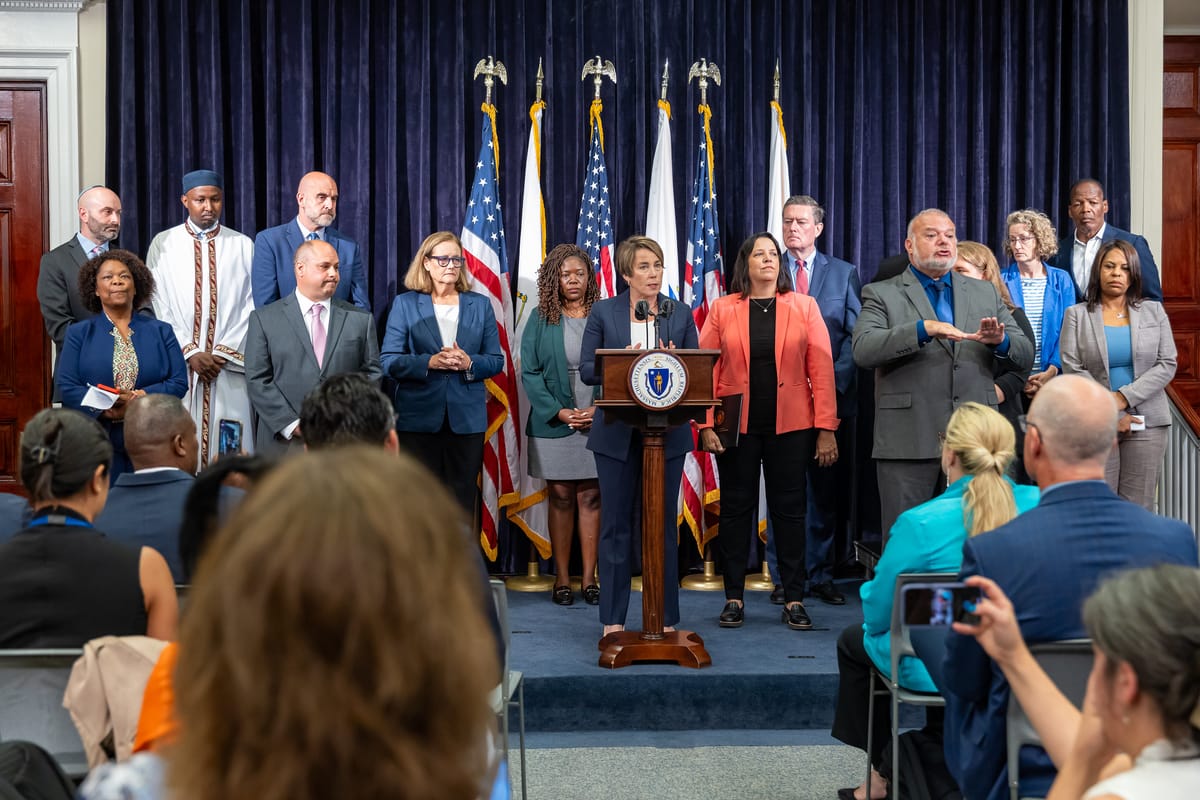
Reduced to its essence, Healey has imposed a set of austerities, for the benefit of the “taxpayer,” and advertised them as efficiencies. She has presented a narrative in which incoming migrants are the chaos agent. She doesn’t call them rapists and murderers like Trump, doesn’t say they’re eating dogs and cats, but she still calls them the problem.
In doing so she’s allowed a pernicious myth to profligate: that immigrants are taking the services intended for our native residents. That they are to blame for the tents people see in the woods here in Worcester and elsewhere. She has not offered a meaningful alternative to this line of thought.
Shaner previously reported for Hell World on a No New Women’s Prisons anti-incarceration march, a strike by nurses at Saint Vincent Medical Center, the cruel displacement of the city's unhoused population, and the Department of Justice investigation into the police department of Worcester, MA.
It's me Luke again now. Feel sick? I feel sick. Imagine a young girl has just seen her mother being kidnapped by the secret police to parts unknown – perhaps forever for all she knows – and is causing a scene. Now imagine your job in this situation is to pile on top of the little troublemaker with five other big brave men. To protect the peace of course.
What kind of person does that job?
What kind of police officer stands by and lets it happen?
Come on out and see me and Niko talk this coming week in Cambridge or else hit up one of these other dates with some fine folks.

Here are a couple more things for everyone to read then after that for paid subscribers only a few videos that have made me cry big tears, some music recommendations, and the worst fucking "A.I." stories I've read this week.
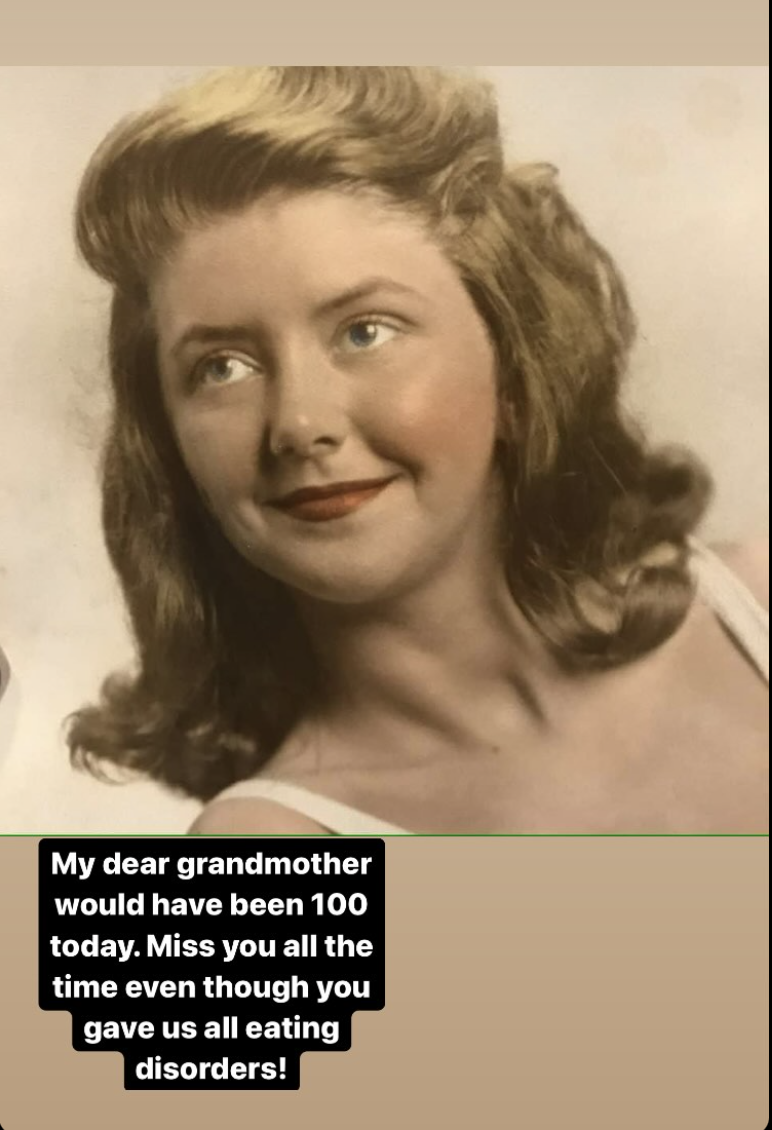
I have written about my beloved grandmother Shirley so many times and probably will never stop doing so but most recently in this piece which will be in my next book and is one of my favorite things I've written in a year or two. Check it out if you never did.
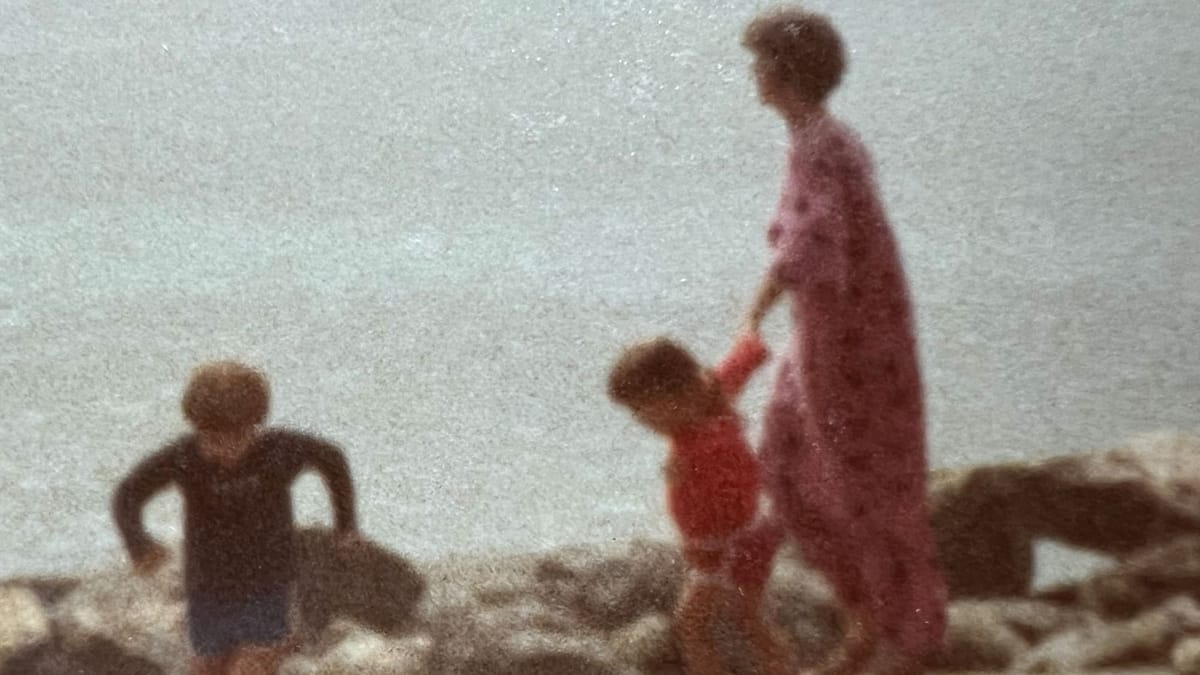
The last time we were all there together my own family and the extended family we left my grandmother to float away into the water. It went smoothly. The throwing of her ashes. These sorts of things are more difficult than you think to get right.
Some of my nieces wrote letters to her in bottles and threw them out.
If I had written one I would have said I love you so much and I think about you almost every day but you fucked us all up so badly.
I swear to god she did but we love her all the same. Perhaps even more for it. We are all so sick.
It was also the anniversary of my father's passing this week and you know I've written about that 100 times too and will continue to do so forever.
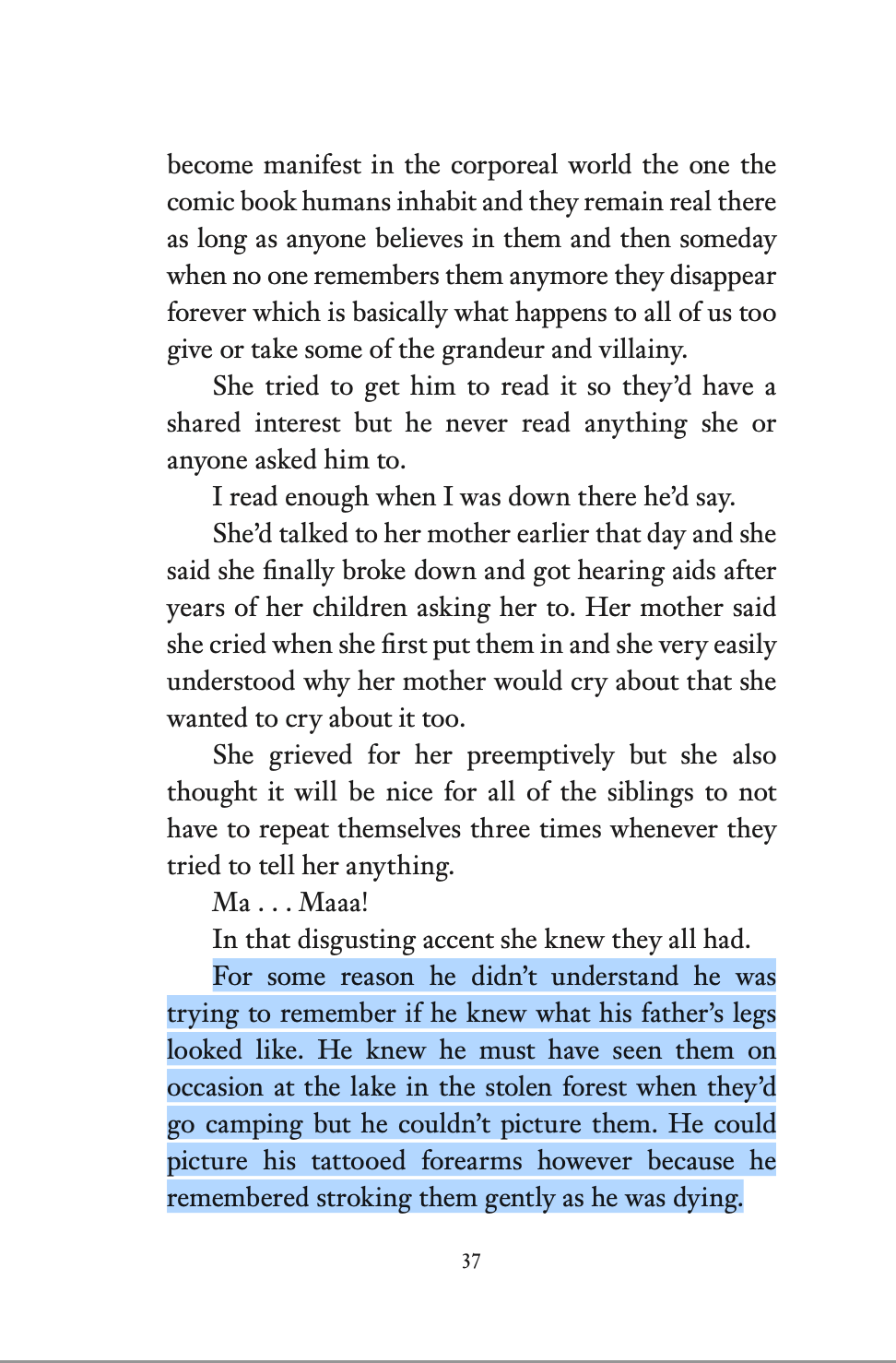
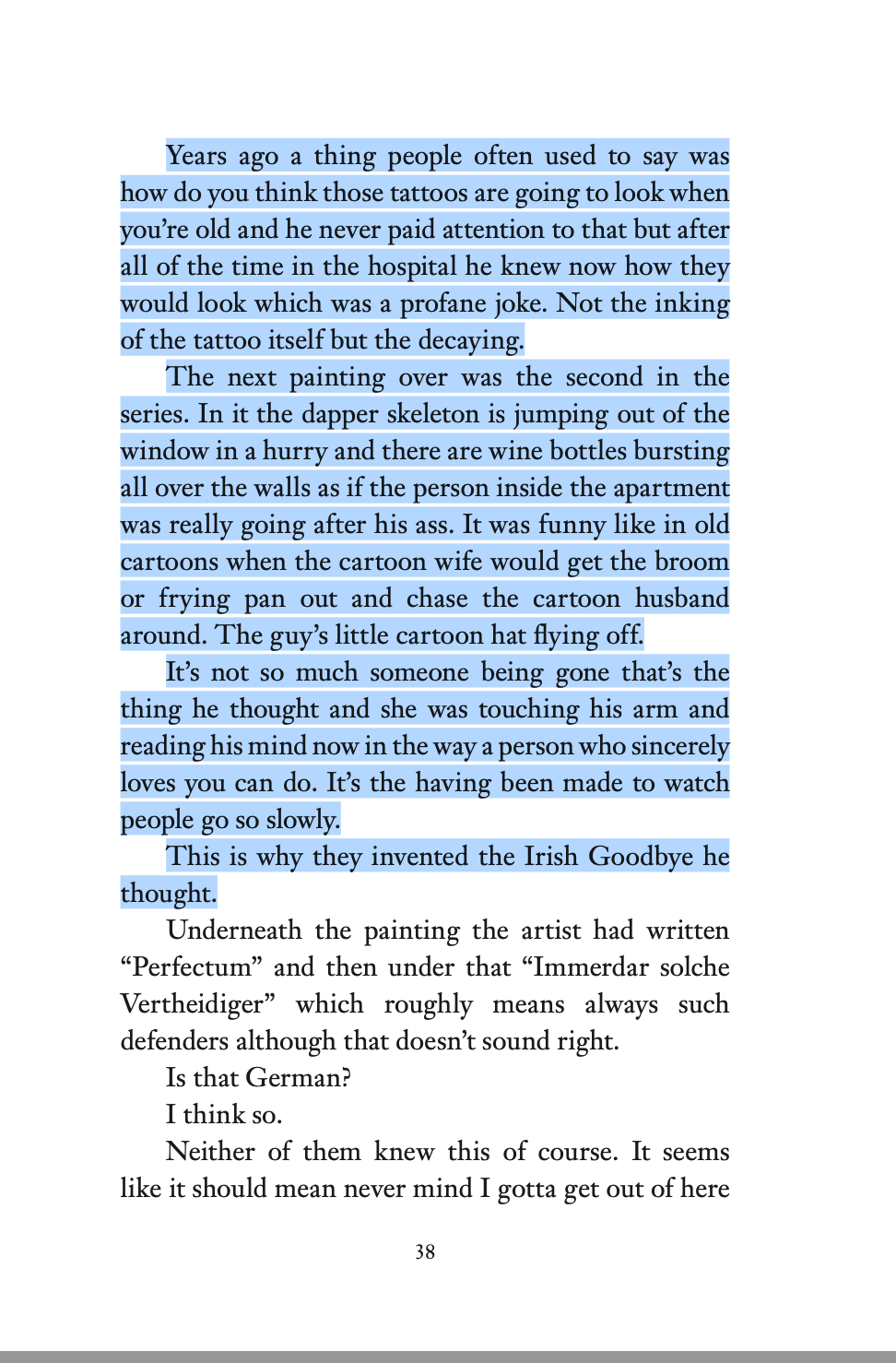
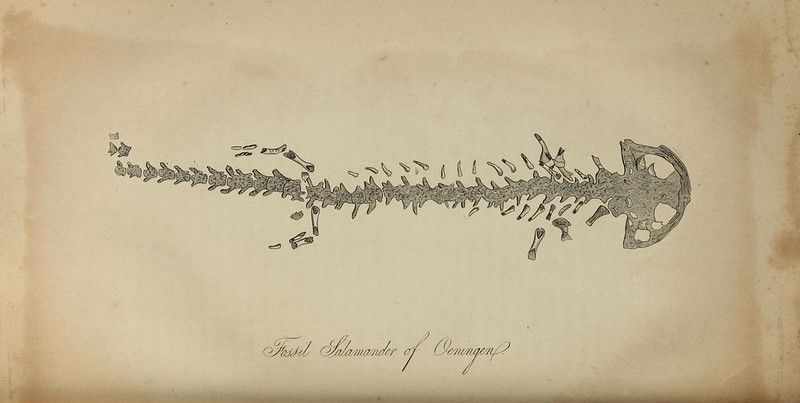
There's a reason why we still run obituaries in newspapers, for even the most average among us, because to note the ending of a life is to remind us all of the most important thing that binds us together as people, as communities, as a civilization. To point out that someone died is to point out that they lived at all.
Ok thanks for being here. Paid readers can stick around for a bunch more below.



